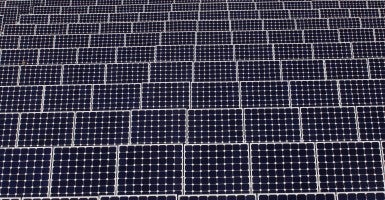MARSHALL, Minn.—It’s a venture that depends on lots of sunshine, but rural southwestern Minnesota residents remain largely in the dark about the biggest solar power project in the state, quietly being plotted for hundreds of acres of farmland surrounding them.
“Our overall concern is and has been the lack of knowledge within our neighborhood,” said Janelle Geurts, who fears solar panels could be erected within 100 feet of her house. “We had heard from a number of people that this project was to be kept quiet. Our concern is protecting our farm land.”
Five hundred acres of farmland will be plowed under to make room for 200,000 to 275,000 photovoltaic panels that will generate 62 megawatts of solar powered electricity, Nextera Energy Resources revealed.
Why here? Location, location, location—near Xcel Energy’s power transmission facilities about five miles north of Marshall in Lyon County.
As word of the massive $100 million project spread after Christmas, residents called an impromptu meeting that had to be moved from the township hall to Guerts’ machine shed to accommodate about 75 apprehensive landowners.
“My biggest concern is my property value. I have busted my hump to get what I have out there. And you wind up with a solar farm 50 feet from your property line?” asked Chuck Muller, an opponent who lives adjacent to the proposed solar site. “I won’t be able to give my house away and that’s what’s got everybody worked up.”
Facing a new state mandate to generate 1.5 percent of its power from solar energy, Xcel Energy picked Nextera from other competitive bids. Because of the size of the project, county and township officials have no local control over the approval process.
“If it’s over 50 megawatts, counties are pre-empted from permitting,” said John Biren, Lyon County zoning administrator, who met with Nextera officials recently.
A backlash against the project became public with a letter published in the Marshall Independent.
“If loss of local control, decreased property values, increased cost of electricity or future cleanup issues of a 500-acre industrial site is a concern, then this project is a concern,” wrote Greg Boerboom of Marshall. “This project, mandated by the metro members of our Minnesota Legislature along with our governor, ignored the facts about the inefficacy of solar power.”




























